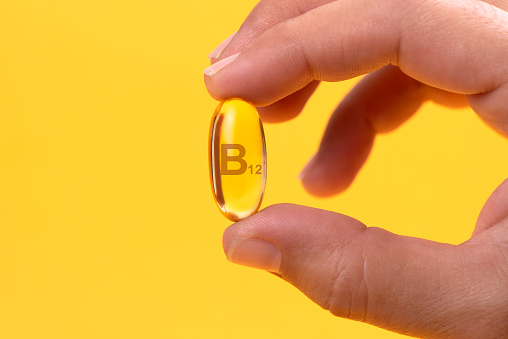Should You Take B-12 at Night | What is the best time to take vitamin B12? | Sources | Advantages
Looking for how fast B12 works and still confuse about should you take b12 at night? Vitamin B12 is a nutrient that many people don’t give much thought to as mostly we know these are vitamin D, vitamin C, omega-3 and more. Often we take this for granted, but getting enough of this vitamin is key to optimal human performance. Typically, it plays an important role in health, also the formation of red blood cells and even the functioning of the nervous system. However, low levels can lead to serious diseases. When you meet with a vitamin B12 deficiency and start taking supplements then questions may arise: Should you take b12 at night?
In this article, we’ll show you everything you need to know about vitamin B12 supplements and truly should you take b12 at night.
What is vitamin B12?
Well, Vitamin B12, or cobalamin, occurs naturally in foods of animal origin but is also available in supplement form. Generally, it is crucial for the formation of RBCs, and however, DNA plays an important role in the functioning of the brain and nerve cells. Importantly, it binds to the proteins in the food we eat, but hydrochloric acid and enzymes in the stomach break down free vitamin B12. There, vitamin B12 binds to a protein called intrinsic factor, normally allowing it to be further absorbed in the small intestine.
Few Important Sources of B12
Food sources of B12
- Fish and snails
- Liver
- Meat
- Eggs
- Bird meat
- Cheese, milk, and yogurt
- Nutritional yeast
- Fortified soy milk
- Rice
- White meat like chickens
- Lean meat
B12 Supplements
Except for food, it is also available in supplement forms, however, several supplements contain vitamin B12 that have high absorption rates. Oral tissues absorb certain forms, such as sublingual tablets or sublingual liquids. Chiefly, the absorption rate is also better than conventional tablets, although some studies have shown no significant difference. No doubt, it’s worth noting when you should take it and if should you take b12 at night especially when taken as a supplement. Surprisingly, vitamin B12 pills come in high doses well above the recommended daily dose. For severe vitamin B12 deficiency, primarily due to intrinsic factor deficiency (pernicious anemia), doctors may prescribe an intramuscular injection of B12.
B12 injections

Injections are the most common treatment for vitamin B-12 deficiency and usually B-12 is injected directly into the muscles. Merely, a dose of 1000 micrograms typically clears the absorption barrier. Treatment schedules can vary, but most injections are given on d3 months 14, 21, 30, 60, and 90 of 3 months. Of course, 3 months is enough for some people, but people with severe B12 deficiency will need to continue receiving B12 injections every month.
Best Time To Take B12
By getting familiar with the right time of taking b12 ultimately you get the answer to should you take b12 at night. Eating vitamins can be a great way to meet your nutritional needs, yet there is a right way. If people don’t take their vitamins properly, they won’t see any improvement, says family physician Rodolfo Perez-Gallardo, MD. Anyhow, your body won’t be able to fully absorb them usually when you don’t know the best time to take your vitamins.
Dr. Perez-Gallardo says it’s more important to sync habits with your eating and drinking schedule than with the time of day. Certainly, Vitamin B12 is a water-soluble vitamin and requires water and eventually get absorb in it. “Take a water-soluble vitamin with a glass of water on an empty stomach,” says Dr. Perez Gallardo. And it can motivate, says he says the best time to take vitamin B12 is in the morning, so it doesn’t affect your sleep. Although, there are many types of B vitamins, generally all of which contribute to the normal functioning of the body. Ultimately, you can get more B vitamins through a multivitamin or certain types through individual vitamins.
Try to take your B vitamins, usually at breakfast or with a meal. For example, vitamin B12 should be taken in the morning because it is important for energy metabolism, which can interfere with sleep if taken at night.
Should You Take B12 At Night
Here your query should you take b12 at night get clears. Entirely, the natural energy-enhancing properties of vitamin B12 work better early in the morning, so you may choose to take a vitamin B12 supplement at night if it works.
Particularly, vitamin B12 works greatly on an empty stomach (or preferably in an acidic environment), so wait a few hours after dinner before taking it. Largely, vitamin B12 affects the pineal gland, mainly which is responsible for the production of melatonin. Essentially, The vitamin increases melatonin production at night and releases it faster, and usually aids in falling asleep easily. Besides trying to have your B vitamins, usually at breakfast in the morning significantly empty stomach.
Is Vitamin B12 integral?
Nonetheless, B12 deficiency is not as common as vitamin D or folic acid deficiency, but it does occur. Commonly, 15% of people over the age of 60 have low levels of vitamin B12, but this statistic includes younger people as well. This is because dietary restrictions or underlying health conditions can affect the numbers. A deficient B12 state can interfere with homocysteine cycling and build-up. Hence becomes toxic to neurons and poses serious risks to vascular and cognitive health.
While B12 absorption is different than most other vitamins, here’s the problem with B12. For B12 to be absorbed from the gut, primarily it needs a specific protein called intrinsic factor (IF). Intrinsic factor forms the B12 complex for absorption in the distal small intestine. Therefore, low levels of IF can interfere with B12 absorption and cause deficiency even when dietary intake is adequate.
Advantage of B12
- Fight against anemia
- Benefits in the production blood cells
- Prevention of serious congenital malformations
- Reduces osteoporosis
- Improving bone health
- Clear risk of macular degeneration
- Relieves mood swings
- Lessens depression
- Crucial for the brain
- Prevents the loss of neurons




